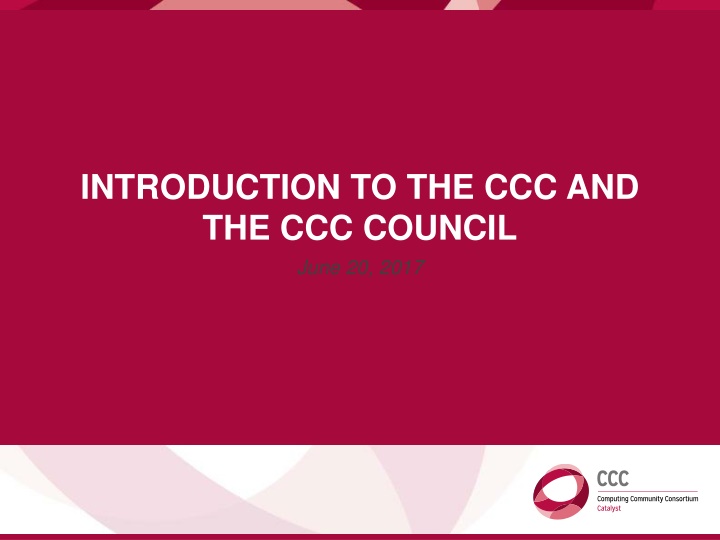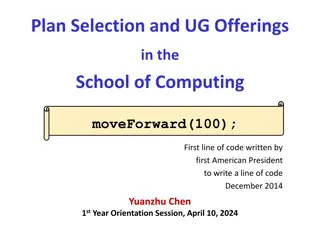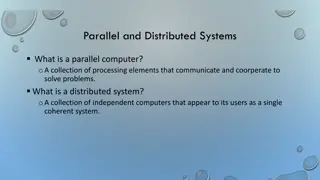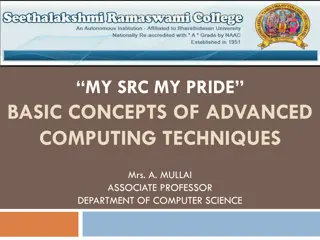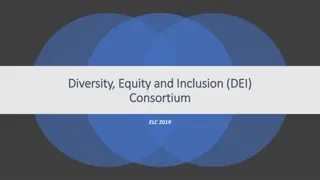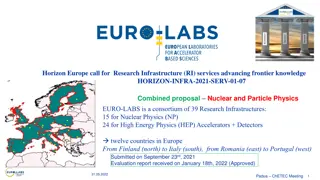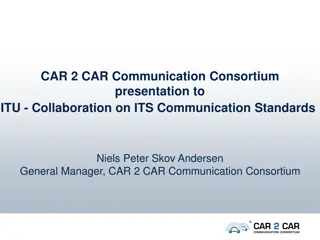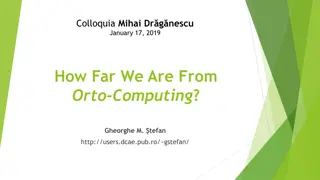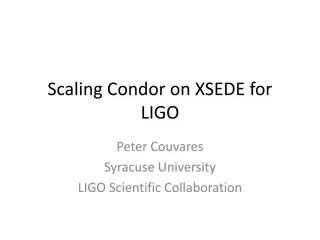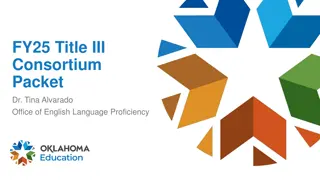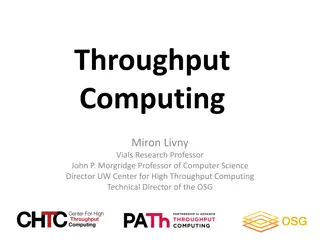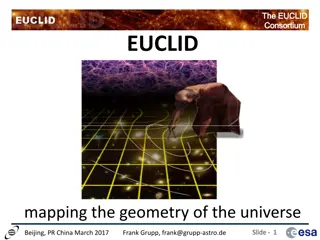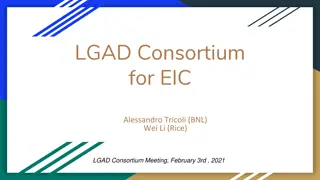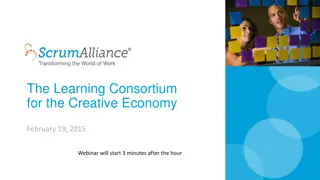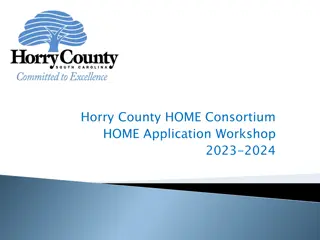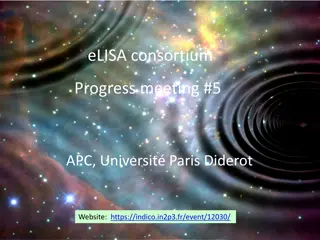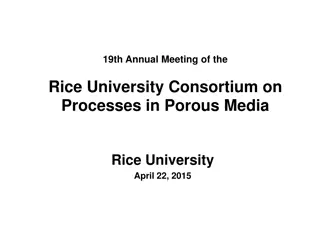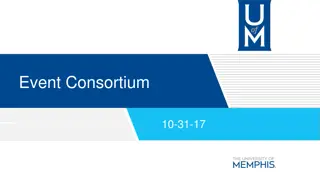Overview of the Computing Community Consortium
The Computing Community Consortium (CCC) was established in 2006 under the Computing Research Association (CRA) to develop a vision for computing research and communicate it to stakeholders. It aims to align computing research with national priorities, encourage high-impact research, and groom new leaders in the field. The CCC plays a vital role in shaping the future of computing through collaborative efforts and leadership within the research community.
Download Presentation

Please find below an Image/Link to download the presentation.
The content on the website is provided AS IS for your information and personal use only. It may not be sold, licensed, or shared on other websites without obtaining consent from the author.If you encounter any issues during the download, it is possible that the publisher has removed the file from their server.
You are allowed to download the files provided on this website for personal or commercial use, subject to the condition that they are used lawfully. All files are the property of their respective owners.
The content on the website is provided AS IS for your information and personal use only. It may not be sold, licensed, or shared on other websites without obtaining consent from the author.
E N D
Presentation Transcript
INTRODUCTION TO THE CCC AND THE CCC COUNCIL June 20, 2017
AN OVERVIEW OF THE COMPUTING COMMUNITY CONSORTIUM Established in 2006 as a standing committee of the Computing Research Association (CRA) Funded by NSF under a Cooperative Agreement Third Award begins in 2017, completed Reverse Site Visit (April 2017) Facilitates the development of a bold, multi-themed vision for computing research and communicates this vision to stakeholders Led by a broad-based Council Staff based at CRA 2
WHAT WELL TRY TO COVER Brief history Role and mission of CCC Organizational details CCC Stakeholders CCC Goals, Activities and Desired Outcomes CCC Impact 3
PRE-HISTORY In the mid-2000 s, NSF CISE leaders and computing research community leaders had similar concerns regarding: The Federal commitment to research in general, and to computing research in particular Public and policymaker perception that computer science is yesterday s news Failure to articulate and coalesce around exciting research visions in computer science research visions that would galvanize the public, policymakers, researchers, and students Need to groom leadership for the field Decrease in student interest GENI Project direction This led to: Increased focus on these issues by NSF CISE and the computing research community Computing Community Consortium solicitation by NSF Eager response by a group of computing research community leaders under the auspices of the Computing Research Association Randy Bryant Susan Graham Anita Jones Dick Karp Ken Kennedy Ed Lazowska Peter Lee Jeff Vitter 4
INFORMAL MISSION A catalyst and enabler for the computing research community Bring the community together to contribute to shaping the future of the field Provide leadership for the community, encouraging revolutionary, high- impact research Encourage the alignment of computing research with pressing national priorities and national challenges (many of which cross disciplines) Work with policymakers to facilitate the translation of these important research directions into funded programs Give voice to the community, communicating to a broad audience the many ways in which advances in computing will create a brighter future Grow new leaders for the computing research community 5
MAJOR ORGANIZATIONAL MILESTONES NSF solicitation + CRA Proposal + Cooperative Agreement (2006) Chair appointed (Winter 2007) + Council appointed (Spring 2007) Vice-Chair position formalized: Fall 2007 Full-time Director (Erwin Gianchandani) joins: Spring 2010 Renewal proposal submitted: Spring 2011 Steady-state organizational structure defined: Fall 2012 Executive Committee launched: Winter 2013 Ann Drobnis joins as Director: Spring 2013 Regular Chair / Vice-Chair succession kicks in: Summer 2013 Proposal and Renewal (in process, 2017) 6
THE RAPIDLY EXPANDING WORLD OF COMPUTING Medicine and Global Health Energy and Sustainability Education Mobile Security and Privacy Natural Language Process HCI Scientific Discovery CORE CSE Technology for Development Machine Learning Sensors Transportation Cloud Computing Big Data Neural Engineering Interacting with the Physical World Graphic: Lazowska Elder Care Accessibility
COMPUTING COMMUNITY CONSORTIUM The mission of Computing Research Association's Computing Community Consortium (CCC) is to catalyze the computing research community and enable the pursuit of innovative, high-impact research. Promote Audacious Thinking: Community Initiated Visioning Workshops Blue Sky Ideas tracks at conferences Communicate to the Community: CCC Blog - http://cccblog.org/ Great Innovative Ideas White Papers and Workshop Reports Social Media Council member presentations Facilitate Investment: Outputs of visioning activities Task Forces Health, AI, Privacy etc. Engage with federal agencies and industry Inculcate Leadership and Service: Engage with CCC Alumni and Sister Organizations Biennial Symposia series Influence Early Career Researchers: Industry Academic Collaborations Leadership in Science Policy Institute Postdoc Best Practices 8
ORGANIZATIONAL STRUCTURES June 20, 2017
CCC ORGANIZATIONAL STRUCTURE Chair, Vice-chair 2 year non-staggered terms Vice-chair is presumptive chair Director, Program Associates (2) Full-time paid positions Executive Committee Chair, Vice-chair, Director 3 at large drawn from Council for 1-year terms CRA Executive Director Council 20 members 3 year terms, at most 2 consecutive terms Support As needed, from CRA Staff 10
WHAT DOES EXECUTIVE COMMITTEE DO? Each member has a major responsibility within the organization Oversees the work of subcommittees and working groups Guides the planning of new activities Oversees the execution of the Strategic Plan and annual Implementation Plan Meets biweekly by teleconference Meets biweekly with NSF by teleconference 11
WHAT DO COUNCIL MEMBERS DO? Shepherd visioning activities Participate in topical task forces Examples: AI and Robotics, Healthcare, Privacy and Fairness Produce and curate relevant resources Monthly teleconferences Develop new activities Examples: CIFellows, LISPI, Post-doc Best Practices, Big Data Hub Industry- Academia Collaboration Engage with government agencies, industry, and sister organizations (NSF, ACM, Big Data Hubs ) Write white papers and blog posts Other requests as needed Monthly teleconferences Three face-to-face meetings each year 12
THE CCC COUNCIL Terms ending June 2020 Nadya Bliss, Arizona State Elizabeth Churchill, Google Juliana Freire, NYU Keith Marzullo, Maryland Greg Morrisett, Cornell Manuela Veloso, Carnegie Mellon Terms ending June 2019 Sampath Kannan, UPenn Maja Mataric, USC Nina Mishra, Amazon Holly Rushmeier, Yale Terms ending June 2018 Liz Bradley, CU Boulder Cynthia Dwork, Microsoft Research Kevin Fu, Univ. Michigan (Leave) Daniel P. Lopresti, Lehigh University Shwetak Patel, Univ. Washington Katherine Yelick, UC Berkeley Jennifer Rexford, Princeton Ben Zorn, Microsoft Research 13
CRA STAFF CCC Director: Ann Drobnis 100% CCC, responsible for day-to-day management of the Organization Senior Program Associate: Helen Wright 100% CCC, responsible for promoting the CCC mission through the website, blog, and social media Program Associate: Khari Douglas 100% CCC, responsible for supporting CCC special programs, workshops, and communications CRA Executive Director: Andy Bernat 10% CCC, responsible for general oversight Other CRA Staff: Peter Harsha, Director of Government Affairs Sandra Corbett Sabrina Jacob 14
NSF INTERACTIONS CISE Office of the Assistant Director AD: James Kurose DAD: Erwin P. Gianchandani Computing and Communications Foundations (CCF) DD: Rao Kosajaru Acting DDD: Anindya Banerjee Information and Intelligent Systems (IIS) Acting DD: Howard Wactlar DDD: Joydip Kundu Advanced Computer and Network Systems (CNS) DD: Ken Calvert DDD: Jeremy Epstein Cyberinfrastructure (ACI) DD: Irene Qualters DDD: Amy Friedlander Computer Systems Research Data Algorithmic Foundations Cyber Human Systems High Performance Computing Communications and Information Foundations Networking and Technology Systems Information Integration and Informatics Networking / Cybersecurity Software and Hardware Foundations Robust Intelligence Program Officer: Nina Amla Software 15
RELATIONSHIP TO COMPUTING RESEARCH ASSOCIATION (CRA) NSF cooperative agreement is with CRA CCC is a standing committee of CRA Andy Bernat, CRA Executive Director, is an ex officio member of the CCC Executive Committee Beth Mynatt, the CCC Chair is a member of the CRA Board of Directors Susan B. Davidson, the CRA chair must consent to CCC Council appointments (and is a former Council member) Greg Hager, past CCC Chair and member of the CRA Board of Directors Greg Morrisett, CCC Council member and member of the CRA Board of Directors Shashi Shekhar, past CCC Council member and member of the CRA Board of Directors Josep Torrellas, past CCC Council member and member of the CRA Board of Directors CCC staff are based in CRA 16
MAJOR STAKEHOLDERS Computing Research Community CRA CSTB (Computer Science and Telecommunications Board, part of National Research Council) Professional societies Academic units Research labs Industry Computing industry, Major users of IT Public Government See following slides 18
GOVERNMENT STAKEHOLDERS Agencies important to us NSF strong ties with CISE NIH growing ties with folks interested in Health IT DARPA ties come and go DoE ties with ASCR; interest in ARPA-E Others that are relevant NIST HHS/ONC 19
GOVERNMENT STAKEHOLDERS Networking and Information Technology R&D (NITRD) Legislatively mandated coordination among Federal R&D agencies National Coordinating Office (NCO) facilitates Interagency working groups Coordinating groups Senior steering groups Community of practice Director is Bryan Biegel 20
PCAST NITRD REPORT 2010 1/3 of the PCAST NITRD Working Group members were CCC Council Members The report drew extensively on CCC White Papers An excellent roadmap for the field 2013 Contributing Members were CCC Council Members An excellent review of progress from 2010 report The challenge now: Continuing to translate it into action 2015 1/3 Contributing Members were CCC Council Members An update to the 2013 report, including recommendations for Federal Agencies The challenge now: restructuring NITRD 21
CCC GOALS AND ACTIVITIES June 20, 2017
GOALS FOR CCC 1. Bring the computing research community together to envision audacious research challenges, and to articulate concrete pathways to enable pursuit of these challenges. 2. Communicate these challenges and opportunities to the broader national community. 3. Facilitate investment in these research challenges by key stakeholders. 4. Inculcate values of leadership and service by the computing research community. 5. Informand influence early career researchers to engage in these community-led research challenges. 23
DESIRED OUTCOMES 1. Create broad awareness of the role computing research will play in future science and technology advances within federal agencies, philanthropic organizations, and industry through concrete examples and products. 2. Facilitate broad engagement of the computing research community in identifying and articulating new directions for computing research, in shaping priorities for those new directions, and in responding to existing opportunities in the computing research ecosystem. 3. Create high-impact tangible resources that inform stakeholders as to the current and potential impact of computing research. 4. Sustain the CCC as a widely accepted catalyst and voice for the computing research community. 5. Grow leadership and community capacity to engage in and respond to national science policy needs. 24
Mapping CCC Strategic Goals to Priority Outcomes Goal 1: Research Challenges Goal 2: Communicate Broadly Goal 3: Research Investments Goal 4: Leadership Goal 5: Influence Community Outcome 1: Agency Awareness Outcome 2: Community Engagement Outcome 3: Tangible Resources Outcome 4: CCC Role Outcome 5: Leadership and Capacity 25
PLANNED ACTIVITIES Envisioning Future Computing Research Engaging and Aligning with National and Computing Research Priorities Communicating Future Computing Research Cultivating Computing Leadership and Community Capacity to Engage and Respond to National Priorities 26
ENVISIONING FUTURE COMPUTING RESEARCH The Computing Community Consortium (CCC) solicits proposals that will galvanize the community to define visions and agendas for exciting frontiers of computing research. Create a new community of researchers. Inform a new funding initiative. Help an extant community define a new trajectory. Goals for next phase Increase the participation of industry leadership and early career researchers at Visioning Workshops Expand the adoption of Blue Sky tracks at computing conferences Establish a biennial symposia series Computing Research: Addressing National Priorities and Societal Host on odd years and host in DC 27
VISIONING PROCESSES Periodic RFP for Community Initiated Activities 6 workshops per year in the last 3 years Top-down (agency initiated) Bottom-up (open call) Sideways (council initiated, joint with other agencies, .) Cyber Social Learning Systems Cybersecurity for Manufacturers Nanotechnology- inspired Information Processing Systems Smart Health Sociotechnical Cybersecurity 28
VISIONING ACTIVITIES Date January 6-7, 2016 Workshop Privacy by Design Catalyzing Privacy by Design Over 40 visioning activities in 10-year history Average of 6 activities per year in the last 4 years Research areas include: Smart and Pervasive Health Nanotechnology-inspired Information Processing Systems Cyber Social Learning Systems Privacy by Design BRAIN Initiative Inclusive Access Personalized Education 13 workshop reports released in past 4 years 20 white papers released in past 4 years Robotics March 5 and 11, 2016 Cyber-Social Learning Systems Workshop 1 August 29-30, 2016 Nanotechnology-Inspired Information Processing Systems of the Future August 31-September 1, 2016 Cyber-Social Learning Systems Workshop 2 November 2-3, 2016 Discovery and Innovation in Smart and Pervasive Health Sociotechnical Cybersecurity Workshop 1 Cyber-Social Learning Systems Workshop 3 Cyber Security for Manufacturers December 5-6, 2016 December 12-13, 2016 January 24-25, 2017 March 14-15, 2017
SUCCESSFUL VISIONING ACTIVITIES Engage the community and relevant stakeholders Facilitate broad thinking with compelling examples Create new avenues for (interdisciplinary) collaboration Prepare and energize the community for future opportunities Rapidly capture and synthesize ideas from the community. Present ideas and engage possible funders and stakeholders Articulate needs and barriers to research impact 30
BLUE SKY Goal - Help conferences reach out beyond the usual research papers. Papers are opened ended and possibly outrageous or wacky. 8 different tracks at 6 different conferences in last 4 years Past CCC Chair Gregory Hager with AAAI-16 Blue Sky award winner Francesca Rossi On average, 13 papers submitted per track at a conference Winners are asked to submit Great Innovative Ideas 31
RECENT BLUE SKY IDEAS CONFERENCE TRACKS BuildSys 2012 Computational Sustainability Track @ AAAI 2013 Computational Sustainability Award @ CHI 2013 Robotics: Science and Systems 2013 Conference on Innovation Data Systems Research (CIDR-2013) Autonomous Agents and MultiAgent Systems (AAMAS-2014, AAMAS-2016, AAMAS-2017) Foundations of Software Engineering (ACM SIGSOFT 2014) Advancement of Artificial Intelligence (AAAI-15,AAAI-16, AAAI-17 ) Advances in GIS (ACM SIGSPATIAL 2015, ACM SIGSPATIAL 2016) Robotics: Science and Systems (RSS) 2015 Advancement of Artificial Intelligence (AAAI-15 and AAAI-16) International Conference on Software Engineering (ICSE 2016) Upcoming: Robotics: Science and Systems (RSS) 2017 AAAI-18 32
ENGAGING AND ALIGNING WITH NATIONAL AND COMPUTING RESEARCH PRIORITIES Agility to respond to requests and ideas. Outreach pulls together visioning with stakeholder needs and timely opportunities Increase scale and capacity through CCC Task Forces Increase engagement with industry, sister organizations and other relevant stakeholders (philanthropy) 33
CCC TASK FORCES CCC task forces are organized around national priorities, community needs, and council member interests. Our current set of topics are: Computing in the Physical World Convergence of Data and Computing Artificial Intelligence and Robotics Healthcare Privacy and Fairness Goal is for CCC to be engaged in ongoing activities around these topics, to identify needs and opportunities in the topic area, and to identify actions (generating white papers, convening a workshop, publicizing information, etc.) that have the possibility of moving the needle for these topics. Annual process to determine topics, membership and priorities. Informed by major stakeholders (NSF, OSTP, PCAST, NITRD, workshops and council members) 34
Held first National Symposium to Highlight the Impact of Computing Research in 2016 Establish a biennial Symposium to communicate the role of computing research to address national and societal priorities Bring in early career researchers to connect them with and invigorate the community 35
COMMUNICATING Workshop Reports White Papers CCC works with community to produce timely white papers that inform policymakers and the broader community on national priorities CCC Blog Provides a continuous stream of information on advances in computing research Opportunities for community to get involved Forum for community discussion Great Innovative Ideas A way to showcase the exciting new research and ideas generated by the computing community Annual events CCC Symposium CRA Snowbird Special Events Computing Research 2016 AI for Social Good 2016 36
NURTURING NEXT GENERATION OF LEADERS Grow leadership and community capacity to engage in and respond to national science policy needs and identify new directions for computing research. Leadership in Science Policy Institute Educates and trains computing researchers on how science policy in the U.S. is formulated and how to advocate for computing research Co-sponsored by CRA s Government Affairs Committee Industry Academic Collaborations CCC collaborated with Big Data Regional Hubs Activities to enhance the research of early career faculty Postdoc Best Practices Program to study institutional support structures for postdocs 3 programs: University of Washington, NY ASCENT, Arizona Computing Innovation Fellows (CIFellows) Project Rapidly created the CI Fellows program to preserve human capital when faculty positions became scarce with the financial crisis 37
AMPLIFICATION Smart and Connected Health Program in NSF and NIH. BRAIN Initiative launched in 2013. CCC co-hosted the SA+TS workshop with SRC and NSF in 2013. NSCI announced in July 2015. CCC co-hosted the Brain Workshop with NSF in 2014. CCC produced a series of blog posts on the topic, featuring one from Doug Burger, and the Convergence of Data and Computing task force frequently overlaps with this topic. CCC has hosted several workshops on related topics, including: Aging in Place (2014), Inclusive Access (2015), and Smart and Pervasive Health (2016) and produced related reports and white papers. Produced Research Needs for Trustworthy, and Reliable Semiconductors Report in 2015. 39
IMPACT: BIG DATA 2010 2008 2016 2008 2012 40
IMPACT: ROBOTICS 2 meetings in Spring, 2016 Report and Congressional Briefing in June, 2016 4meetings during summer 2008 National Robotics Initiative announced in summer 2011 OSTP issues directive to all agencies in summer 2010 to include robotics in FY 12 budgets Roadmap published May 2009 Extensive discussions between visioning leaders & agencies Henrik Chistensen 41
IMPACT: ROBOTICS 2 meetings in Spring, 2016 NRI 2.0 announced November 2016 Report and Congressional Briefing in June, 2016 Next Generation Robotics published June, 2016 Henrik Chistensen 42
IMPACT: ARCHITECTURE 2010 2012 2010 2013 Mark Oskin Washington Josep Torrellas UIUC Mark Hill Wisconsin 43
IMPACT: ARCHITECTURE 2016 2013 2016 Tom Wenisch Michigan Mark Hill Wisconsin Luis Ceze Washington 44
IMPACT: HEALTH IT October 2009 Workshop National Science Foundation National Library of Medicine Computing Community Consortium Discovery and Innovation in Health IT American Medical Informatics Association Agency for Healthcare Research and Quality National Institute of Standards and Technology Office of the National Coordinator for Health Information Technology Smart and Connected Health (SCH) PROGRAM SOLICITATION NSF 13-543 REPLACES DOCUMENT(S): NSF 12-512 National Science Foundation Directorate for Computer & Information Science & Engineering Division of Computing and Communication Foundations Division of Computer and Network Systems Division of Information & Intelligent Systems Directorate for Engineering Directorate for Social, Behavioral & Economic Sciences National Institutes of Health Eunice Kennedy Shriver National Institute of Child Health and Human Development October 2012 Workshop National Cancer Institute National Human Genome Research Institute National Institute of Biomedical Imaging and Bioengineering 45 National Institute on Aging Office of Behavioral and Social Sciences Research
IMPACT: AGING IN PLACE Joint NIH/CCC Meeting September 2014 Produced Workshop Report February 2015 NIH released new RFP informed by AIP Workshop October 2015 PCAST Report March 2016 46
COMPUTING COMMUNITY CONSORTIUM The mission of Computing Research Association's Computing Community Consortium (CCC) is to catalyze the computing research community and enable the pursuit of innovative, high-impact research. Promote Audacious Thinking: Community Initiated Visioning Workshops Blue Sky Ideas tracks at conferences Communicate to the Community: CCC Blog - http://cccblog.org/ Great Innovative Ideas White Papers and Workshop Reports Social Media Council member presentations Facilitate Investment: Outputs of visioning activities Task Forces Health, AI, Privacy etc. Engage with federal agencies and industry Inculcate Leadership and Service: Engage with CCC Alumni and Sister Organizations Biennial Symposia series Influence Early Career Researchers: Industry Academic Collaborations Leadership in Science Policy Institute Postdoc Best Practices 47
